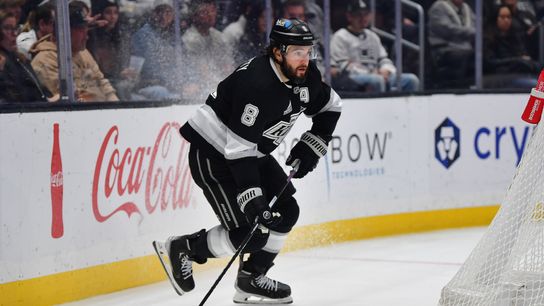LOS ANGELES -- In the first game back from the 4-Nations break for both the Los Angeles Kings and Utah Hockey Club, it was an expectedly sloppy game with both team's trying to knock off some rust.
For 4-Nation's gold medalist Drew Doughty it was his best game in a Kings jersey this season, finishing with a goal, two assists and a plus-three rating. It wasn't a typical night for Doughty usage-wise. Playing "only" 21:40 and receiving just the fourth-most even-strength time on ice amongst Kings defensemen, this was the most evenly distributed I've seen the Kings' ice time on defense with Doughty in the lineup.
Doughty, Joel Edmundson, Vladislav Gavrikov and Mikey Anderson were all within about a minute of each other with no one taking the majority of minutes.
It was a rare sight for a Doughty-led blue line and a great move by Jim Hiller. Yes, Doughty had the benefit of playing over the last two weeks, but the more cerebral usage was also a big part of his impressive night.
Going for quality over quantity with Doughty, the Kings didn't try to ride him in every situation and put trust in the pair of Anderson and Gavrikov to carry some heavy minutes for them. This should be the way forward for the Kings' blue line. They don't need to play Doughty 25+ minutes a night anymore and will likely get more out of him if he hovers closer to that 21-22-minute mark.
Providing a high-quality 25+ minutes a night is extremely difficult for even the best defensemen. Just nine players are averaging that kind of ice time in the NHL right now and all but Roman Josi are 27 or younger. It's not a slight on Doughty but a reality that he shouldn't be playing that much anymore.
Hiller was non-commital about Doughty's usage moving forward post-game.
"I don't know, there will be times when he gets that (25+ a night)," said Hiller. "We ran him pretty hard before, but Mikey [Anderson] was out, so Mikey and Gavrikov have been playing, 25-27 some nights, I think we'll maybe spread those a little more between them. But I don't think you'll see one guy at 28 and the other guys at 18,19,20, I think they'll be a little bit more balanced than we've seen in past years."
It's a nice sentiment from Hiller and the way things should be, but with the usage of players like Doughty and Anze Kopitar, I'll believe the reduced usage when I see it. When we get into the final stretch and the playoffs, I have a sneaking suspicion we'll see Doughty creep back up to the 25+ range.
However, for now, it's an encouraging sign that Hiller seems aware that running Doughty the way they have in previous years isn't a recipe for success.
On the flip side of that, Brandt Clarke saw just seven shifts and 5:15 of time on ice. We knew the return of Doughty would hurt Clarke's ice time, that was obvious when he was scratched in Doughty's first two games, and with the blue line fully healthy Clarke seems like the last man out.
Hiller said Clarke's usage is one of the downsides to running 11/7, someone ends up playing a lot less than everyone else, but they don't want Clarke playing 5:00 regularly.
"It's hard with seven D," said Hiller. "It's hard to balance the minutes, unfortunately, one guy is there as the support and depending on how the game plans out, there's just different things that can happen. Sometimes the downside to seven is, if you play one guy too much then you play someone else [not enough], you have two guys that are out of rhythm. So it becomes, 'okay who's going better', we want to keep one guy in better rhythm than the other guy. Tonight that's just the way it shook out."
"I don't know if I'd use the word harm," said Hiller on concerns about harming Clarke's development if that usage becomes consistent. "We don't want Clarkie playing five minutes a night, that's for sure, I don't think that's good for a young player at all. So what's better? What's the alternative? Get him in and play him 15 or 12? So we'll see."
It brings us back to a consistent problem with the Kings over the last few seasons, it's extremely difficult to treat yourself like a contender and develop prospects. Obviously, the Kings' coaching staff doesn't view Clarke as one of LA's six best defensemen, which means he doesn't play, and that isn't good for his development. But they're more focused on winning hockey games and the playoff race than Clarke's development.
As Hiller pointed out, what's the alternative? Yes, I can hear you screaming that Clarke is one of their six best defensemen and should play in the top six, but the coaches don't agree which puts Clarke in a difficult spot.
Clarke's usage moving forward is something very interesting to monitor, especially if the Kings at a forward before the trade deadline and return to the 12-6 alignment.
